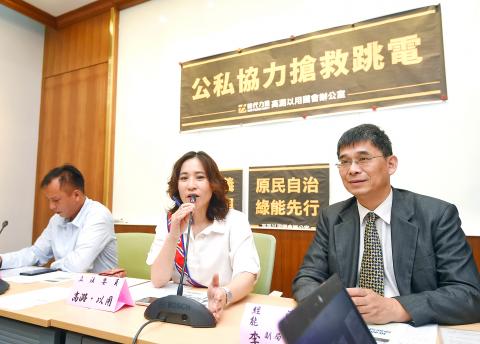A pilot program by the Bureau of Energy to subsidize civic groups’ “clean energy” generating facilities in the nation’s remote areas could help build a new energy model in Taiwan, New Power Party Legislator Kawlo Iyun Pacidal said yesterday.
Kawlo in September last year urged Premier William Lai (賴清德) to balance the needs for clean energy and energy justice during a question-and-answer session at the Legislative Yuan.
In response, the bureau on May 20 set down guidelines for subsidizing the construction of clean energy generating facilities in remote areas by civic groups.

Photo: Fang Pin-chao, Taipei Times
“The program will allow residents in remote areas, especially Aborigines, to lead the development of clean energy generating facilities. This will not only help promote energy democracy, but also better ensure that those areas have sufficient energy,” said Kawlo, who is Amis.
Considering that the nation is highly dependent on Taiwan Power Co (Taipower) for energy, the project would also improve the stability of the nation’s energy supply, she said.
Many Aboriginal communities in remote areas have the natural resources to develop solar, hydroelectric or geothermal power plants, but building those facilities would require collaboration, bureau Deputy Director-General Lee Chun-li (李君禮) said.
“The bureau used to focus on building power supply systems with Taipower in remote areas, but now we hope to encourage residents in those areas to lead such projects,” he said.
Such facilities could provide backup power to local communities when Taipower facilities are damaged by natural disasters, Lee added.
“If they have any surplus energy, communities can also profit from that by selling it to Taipower,” he said.
The bureau is to accept 10 proposals to build clean energy generating facilities in remote areas and provide a subsidy of up to NT$2 million (US$66,912) to each project to cover expenses in the initial assessment stage.
“Civic groups only need to have a rough idea of what kind of facility they would like to build, and the government would help pay the expenses needed to hire professionals for further investigation and assessments,” Li said.
In addition, the government would subsidize up to half of the construction expenses — with a cap of NT$10 billion — for each of the five cases that have passed initial reviews.
Aboriginal groups would have higher priority than other groups, the bureau said, adding that the deadline for applications is Aug. 31.
“We hope to learn from this process and are ready to make adjustments if anything needs to be changed,” Lee said.
The program requires the government to inform Aborigines and obtain their consent before building power generating facilities in their communities, Kawlo said, adding: “Community residents can be masters of their own fate and lead local energy plans.”
Hopefully, this program will soon create the first energy plant jointly built by civic groups and the government, she said.

A preclearance service to facilitate entry for people traveling to select airports in Japan would be available from Thursday next week to Feb. 25 at Taiwan Taoyuan International Airport, Taoyuan International Airport Corp (TIAC) said on Tuesday. The service was first made available to Taiwanese travelers throughout the winter vacation of 2024 and during the Lunar New Year holiday. In addition to flights to the Japanese cities of Hakodate, Asahikawa, Akita, Sendai, Niigata, Okayama, Takamatsu, Kumamoto and Kagoshima, the service would be available to travelers to Kobe and Oita. The service can be accessed by passengers of 15 flight routes operated by

MORE FALL: An investigation into one of Xi’s key cronies, part of a broader ‘anti-corruption’ drive, indicates that he might have a deep distrust in the military, an expert said China’s latest military purge underscores systemic risks in its shift from collective leadership to sole rule under Chinese President Xi Jinping (習近平), and could disrupt its chain of command and military capabilities, a national security official said yesterday. If decisionmaking within the Chinese Communist Party has become “irrational” under one-man rule, the Taiwan Strait and the regional situation must be approached with extreme caution, given unforeseen risks, they added. The anonymous official made the remarks as China’s Central Military Commission Vice Chairman Zhang Youxia (張又俠) and Joint Staff Department Chief of Staff Liu Zhenli (劉振立) were reportedly being investigated for suspected “serious

ENHANCING EFFICIENCY: The apron can accommodate 16 airplanes overnight at Taoyuan airport while work on the third runway continues, the transport minister said A new temporary overnight parking apron at Taiwan Taoyuan International Airport is to start operating on Friday next week to boost operational efficiency while the third runway is being constructed, the Ministry of Transportation and Communications said yesterday. The apron — one of the crucial projects in the construction of the third runway — can accommodate 16 aircraft overnight at the nation’s largest international airport, Minister of Transportation and Communications Chen Shih-kai (陳世凱) told reporters while inspecting the new facility yesterday morning. Aside from providing the airport operator with greater flexibility in aircraft parking during the third runway construction,

American climber Alex Honnold is to attempt a free climb of Taipei 101 today at 9am, with traffic closures around the skyscraper. To accommodate the climb attempt and filming, the Taipei Department of Transportation said traffic controls would be enforced around the Taipei 101 area. If weather conditions delay the climb, the restrictions would be pushed back to tomorrow. Traffic controls would be in place today from 7am to 11am around the Taipei 101 area, the department said. Songzhi Road would be fully closed in both directions between Songlian Road and Xinyi Road Sec 5, it said, adding that bidirectional traffic controls would